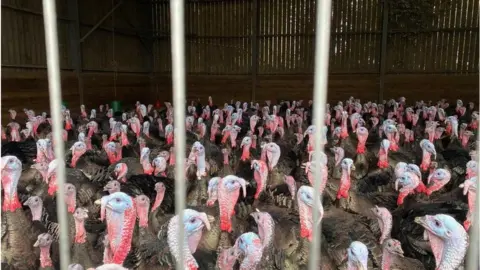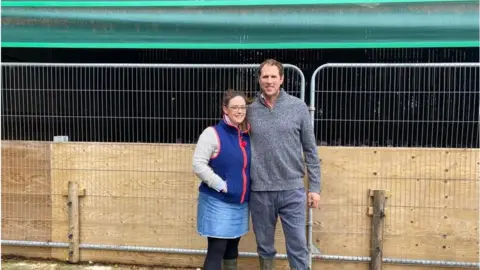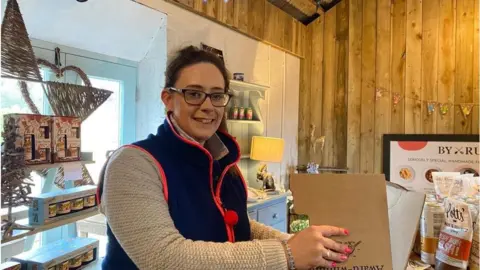Bird flu fears force Devon and Cornwall turkey flocks indoors
 AFP
AFPPoultry farms in Devon and Cornwall have been forced to move their flocks indoors as measures to counter the spread of bird flu come into effect.
The England-wide restrictions aim to prevent captive birds coming into contact with wild ones amid the largest-ever outbreak of avian flu.
The UK has recorded more than 200 confirmed cases since October 2021.
It is the second lockdown, or "flockdown" - as some farmers call it, this year.
John Malseed, a turkey farmer at Frenchbeer Farm near Chagford, has reared about 8,000 birds to be sold before Christmas.
He said it was a "very scary situation financially" for breeders.
'Insurance not offered'
"If you get avian flu, you will have to cull all of your flock," he told BBC Radio Devon.
"If you have four different sheds on your farm and one gets it, the government will come in and cull all of your poultry, so you will have no poultry to sell.
"There was insurance for it [but] they are now not offering it because it is rife up and down the country."
According to the Animal and Plant Health Agency, a number of captive birds in Devon and Cornwall have already been culled due to confirmed avian flu cases.

Will and Kate Martin, who run Treway Farm near St Austell, said they were "extremely worried" about the impact on the industry.
"It's absolutely devastating," Mr Martin said.
"We've got friends up the country who have lost their whole entire flocks and that's their business and livelihood gone just from the flu."
 AFP
AFPMs Martin, who is also the chair of the Traditional Farm Fresh Turkey Association, said it was a "pure reality" there would be shortages.
"Prices, particularly from producers like ourselves, are set for Christmas," she said.
"As far as a shortage, that's just a pure reality - there have been millions of birds culled that should have been on Christmas tables this year, so get booked in with your local farmer."
The government said everyone must keep their birds inside regardless of the type of bird or numbers kept.
Other compulsory biosecurity measures include cleansing and disinfecting footwear and clothing before and after contact with birds, reducing the movement of people on to premises and storing bedding properly.

Follow BBC News South West on Twitter, Facebook and Instagram. Send your story ideas to [email protected].
